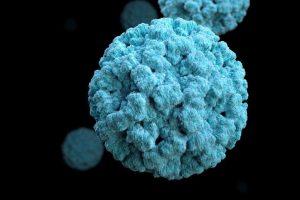Henipavirus:

Camp Hill virus, a henipavirus related to Nipah, has been recently detected in North America, raising concerns of a potential outbreak.
- Henipaviruses (family Paramyxoviridae) are zoonotic, negative-sense RNA viruses.
- Fruit bats (Pteropus species, also called ‘flying foxes’) are the natural hosts of Henipaviruses.
- Henipaviruses can cross species barriers, infecting various mammals, including humans.
- They often cause severe respiratory illness and encephalitis and are associated with high case fatality rates.
- The two most notable henipaviruses are Hendra virus and Nipah virus.
- Hendra virus, first identified in Australia, has caused outbreaks with mortality rates up to 70%.
- The Nipah virus has been linked with numerous outbreaks in Southeast Asia, particularly in Malaysia and Bangladesh, with case-fatality rates estimated at 40%–75% depending on surveillance and clinical management.
- Direct contact with infected animals (e.g., bats, horses, pigs).
- Consumption of contaminated food or water.
- Human-to-human transmission through bodily fluids, close contact, or respiratory droplets.
- Symptoms:
- Common symptoms include dizziness, headache, fever, and myalgias.
- Fatality often occurs when the disease progresses to severe encephalitis and symptoms like confusion, abnormal reflexes, seizures, and coma occur.
- It lies in their ability to encode several proteins which block the innate immune response in infected animals and humans.
- These inhibit the cell’s response to viral infection, and allow viral replication.
- Treatment: Treatment is symptomatic, and no vaccine or antiviral drug has been developed so far to treat the disease.




